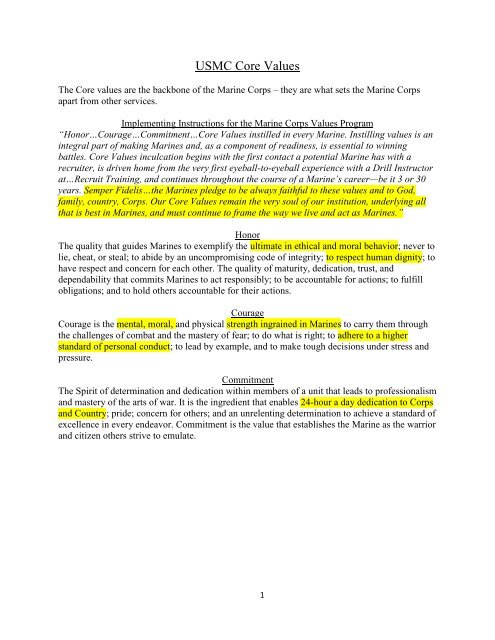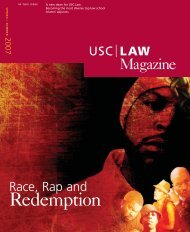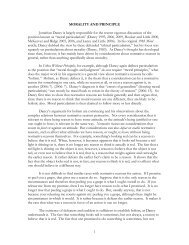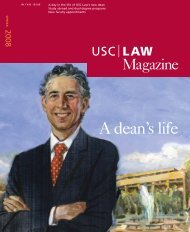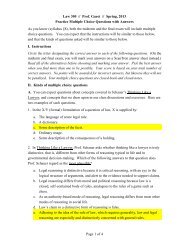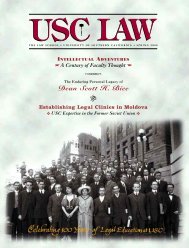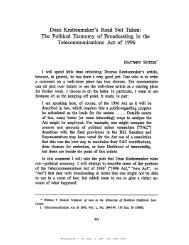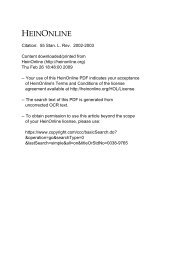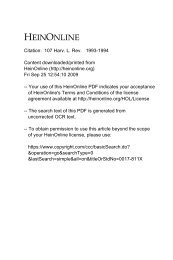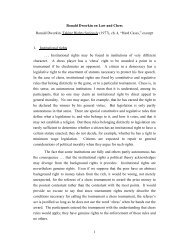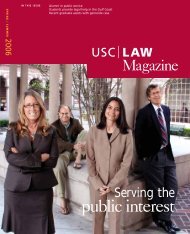USMC Core Values
USMC Core Values
USMC Core Values
Create successful ePaper yourself
Turn your PDF publications into a flip-book with our unique Google optimized e-Paper software.
<strong>USMC</strong> <strong>Core</strong> <strong>Values</strong><br />
The <strong>Core</strong> values are the backbone of the Marine Corps – they are what sets the Marine Corps<br />
apart from other services.<br />
Implementing Instructions for the Marine Corps <strong>Values</strong> Program<br />
“Honor…Courage…Commitment…<strong>Core</strong> <strong>Values</strong> instilled in every Marine. Instilling values is an<br />
integral part of making Marines and, as a component of readiness, is essential to winning<br />
battles. <strong>Core</strong> <strong>Values</strong> inculcation begins with the first contact a potential Marine has with a<br />
recruiter, is driven home from the very first eyeball-to-eyeball experience with a Drill Instructor<br />
at…Recruit Training, and continues throughout the course of a Marine’s career—be it 3 or 30<br />
years. Semper Fidelis…the Marines pledge to be always faithful to these values and to God,<br />
family, country, Corps. Our <strong>Core</strong> <strong>Values</strong> remain the very soul of our institution, underlying all<br />
that is best in Marines, and must continue to frame the way we live and act as Marines.”<br />
Honor<br />
The quality that guides Marines to exemplify the ultimate in ethical and moral behavior; never to<br />
lie, cheat, or steal; to abide by an uncompromising code of integrity; to respect human dignity; to<br />
have respect and concern for each other. The quality of maturity, dedication, trust, and<br />
dependability that commits Marines to act responsibly; to be accountable for actions; to fulfill<br />
obligations; and to hold others accountable for their actions.<br />
Courage<br />
Courage is the mental, moral, and physical strength ingrained in Marines to carry them through<br />
the challenges of combat and the mastery of fear; to do what is right; to adhere to a higher<br />
standard of personal conduct; to lead by example, and to make tough decisions under stress and<br />
pressure.<br />
Commitment<br />
The Spirit of determination and dedication within members of a unit that leads to professionalism<br />
and mastery of the arts of war. It is the ingredient that enables 24-hour a day dedication to Corps<br />
and Country; pride; concern for others; and an unrelenting determination to achieve a standard of<br />
excellence in every endeavor. Commitment is the value that establishes the Marine as the warrior<br />
and citizen others strive to emulate.<br />
1
Written Code of Ethics. The Marine Corps does not have a specific code of ethics written<br />
succinctly into one document. Our written codes of “military ethics” exist in many forms and<br />
documents. It is primarily a continuation of the unwritten practices accepted and advocated by<br />
our society and supported by our legal system. In written form it exists in such documents as:<br />
1) The Oath of Office<br />
2) Commissioning Document<br />
3) The Uniform Code of Military Justice<br />
4) The Code of Conduct<br />
5) The Code of Ethics for Government Employees<br />
Unwritten Code of Ethics. There are many standards of conduct not found in any manual or<br />
document. These are some of the time-honored traditions we learn as Marines. Ethical decision<br />
making occurs every time a Marine is faced with a need to decide—now—what to do. It may be<br />
a cut-and dry decision in garrison or it may be one on the battlefield far more ambiguous. At the<br />
heart of a leader’s ability to choose correctly is a firm grounding in both institutional and<br />
individual values that will point the correct direction, even when the Marine is tired or acting<br />
under conditions of extreme stress.<br />
“Special Trust and Confidence”.<br />
a. A commission states the President of the United States has “special trust and confidence”<br />
in the patriotism, valor, fidelity, and abilities of an officer.<br />
b. Special trust and confidence is based on natural presumptions Marine officers will<br />
practice integrity, good manners, sound judgment, and discretion; and that they will do so<br />
with honor and courage.<br />
c. Specifically, the President reposes this special trust and confidence in four things:<br />
a. Patriotism. Love and loyalty to one’s country.<br />
b. Valor. It is courage in battle. No person can truly know the depth of one’s<br />
personal courage until it is tested.<br />
c. Abilities. Talents and skills each one of us possess.<br />
d. Fidelity. Faithful devotion to duty.<br />
d. Officers are typically granted special privileges; however, with these privileges come<br />
special responsibilities and obligations.<br />
Noblesse Oblige.<br />
a. “Noblesse oblige” literally means nobility obligates. This concept originated in the<br />
eighteenth and nineteenth century as men of positions saw that by virtue of their position,<br />
it was incumbent upon them to render appropriate public service.<br />
b. As officers, noblesse oblige is a principle that applies to personal behavior.<br />
c. Officers who violate the code of their profession must expect to be punished. The rank or<br />
position is not a shield from justice. The price officers pay for “special trust and<br />
confidence” is exacting and unremitting personal accountability.<br />
2


